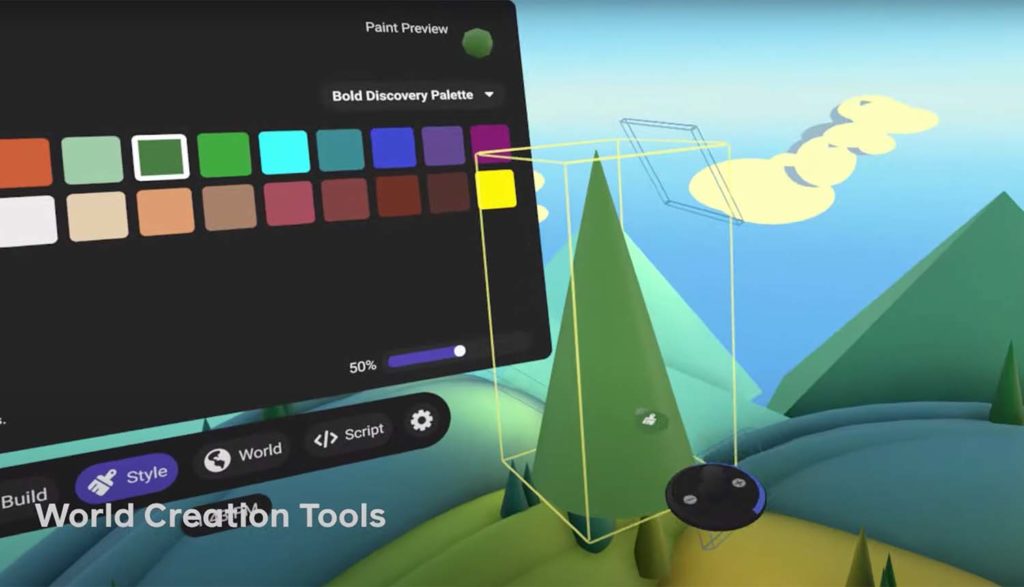Surely by now you’ve heard about Facebook’s new Meta rebrand and the company’s desire to create its own next-level of “incredible virtual reality access and entertainment,” according to CEO Mark Zuckerberg. (If you haven’t, well, you ought to visit this humble blog more often.) Meta’s first foray into that fledgling “metaverse” is something called Horizon Worlds—a gaming and building hub app that some have described as a cross between Roblox and Minecraft.
Since we haven’t talked about this new virtual reality app before, let’s address the basics of how it works. For one thing, you can only sign into this free experience with a Facebook account and an Oculus VR headset. (Owners of other VR brands that Facebook doesn’t sell need not apply at this point.)
Once you get in there, you create and float about as a personalized, legless cartoon avatar. And you can then interact in real time with anybody who happens to be there by simply using your headset mic and shouting out a quick howdy. Or if you prefer, you can keep to yourself, mute your mic, and meander around to play games or create with Horizon World’s toolsets.
If you boil Horizon Worlds down to its basics, it’s sort of a virtual place where you can access simple tools and write your own game code to create everything from a Ghostbusters wagon to a paintball game field to a Disney castle or, hey, an entire theme park if you’ve got the time. Some of the worlds here are just cool places to hang out and play some virtual air hockey or maybe grab a virtual guitar and jam with other users. And then, of course, there are a whole lot of user-made games. In our first short visit we played some simple target-shooting games, a bowling game and a game that was like a cross between Hungry, Hungry Hippos and a flock of baby birds. And you can find creative spins on gameshows like The Dating Game, American Idol, etc.
Horizon Worlds offers some interesting privacy features, too. This app gifts you with a watch-like thing on your virtual left wrist. And besides mic muting it also offers a button for a “safe zone.” A brief tap creates a “completely private space for you at any time,” Horizon declares. No one can see or talk to you while you’re in the safe zone, and you can report any problems you’ve had from in there, too. Oh, and if you do send in a report, it will also include the last few minutes of your Horizon audio and other interactions, since a recording is being captured by your Oculus headset on a rolling basis.
That, of course, is all very nice. An app like this needs to have some kind of privacy and security features. If nothing else, we’ve learned that much from the problems that have popped up on other social media interaction sites.
We’ll do a more in-depth dive on Horizon Worlds content soon. But one important thing we need to address is the fact that there are potential problems here, too.
As you might expect, parents need to be on the lookout with this new VR playland. I mean all of the things we’ve already mentioned sound pretty fun, right? And who likes VR fun more than kids?
Tough luck for them, it would seem—at least on the surface. Horizon Worlds is an app that Meta has declared “limited to adults 18 and older.” It’s not that we saw anything particularly “adult” there when we strolled around, but there could be. And if history has taught us anything, there probably will be at some point.
Also, since Horizon uses Oculus video collection of everything for security purposes, kids can’t be in the mix. Congress, in an effort to better protect youngsters online, passed laws that limit the amount of data that internet companies can collect from children. (Meta can thank problems with its own Instagram for that.)
But here’s the thing: Kids are grabbing VR headsets and leaping into Horizon Worlds anyway. As soon as we logged on, for instance, we noted the voice of a youngster piping up. And he couldn’t have been any older than 10. And there have been numerous articles reporting similar encounters.
I spotted a Washington Post piece, for instance, that noted how easily kids have been slipping into Horizon Worlds on a regular basis. And child protection advocates are raising red flags of concern over that fact. Washington Post reporter Will Oremus wrote:
“When new online forums arise that attract kids, sexual predators ‘are often among the first to arrive,’ said Sarah Gardner, vice president of external affairs at Thorn, a tech nonprofit that focuses on protecting children from online sexual abuse. ‘They see an environment that is not well protected and does not have clear systems of reporting. They’ll go there first to take advantage of the fact that it is a safe ground for them to abuse or groom kids.’”
The article closes with the suggestion that Meta should “rethink its approach, prioritize either keeping kids out of the app or keeping them safe within it.” That’s a wise recommendation. And we can all hope that Meta, in its rush to shore up its dwindling user numbers, pauses long enough to think through all the safety and interaction concerns of its new metaverse.
But in the meantime, it’s up to you dear parent to be the watcher on the wall. Be aware and be informed. And we’ll strive to give you information that can be as helpful as possible along the way.







Recent Comments